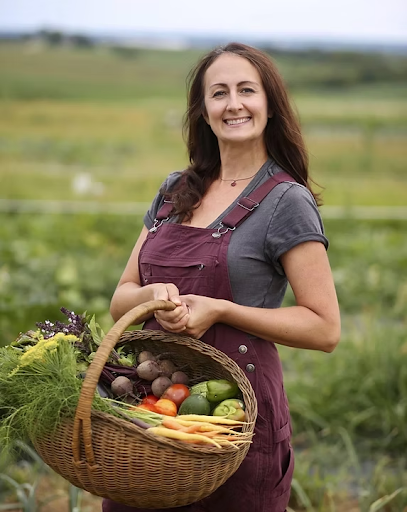Justyna Miranda Is Reclaiming Food, Farming And Community Through City Girl Farming

An individual who, after experiencing hardships and frustrations, chooses not to walk away but instead turns disillusionment into action is remarkable. After all, it takes a rare kind of dedication to transform adversity into purpose. Justyna Miranda, founder of City Girl Farming, possesses that resolve. Drawing from her unease with the modern food system, she founded a regenerative business rooted in care, connection, and change. Through her work as a farmer, culinary artisan, and advocate, Miranda is planting more than just vegetables. She's sowing the seeds of a movement.
Born and raised in Poland during a time of conflict, Miranda's relationship with food wasn't a product of convenience. It was the result of daily labor and survival. "My grandmother turned even the smallest urban plots into gardens full of life," she recalls. "Pulling radishes in the morning or gathering eggs from the chicken coop was simply part of the rhythm of being alive." This visceral connection to the land stayed with her, although she wouldn't understand how rare it was until she left home.
At age 19, Miranda immigrated to the United States. Landing in a country of abundance was, at first, jarring. "I was struck by how much food was available, but I'm more shocked by how far removed people seemed from it," Miranda shares. The disconnection was everywhere. It was on grocery shelves, in overflowing dumpsters, and the fast-paced meals were consumed without thought or gratitude. "Coming from a place where every seed was planted with intention and every meal was a result of effort, this detachment was disorienting," she adds. It was the first sign of a much deeper problem she would later spend her life working to address.
Miranda later pursued a career in hospitality. She enrolled in culinary school in Chicago and earned a degree in the field. Here, her early instincts began to crystallize into a clearer understanding of the food industry's deeper issues. "I saw how access to healthy and nourishing meals depended on socioeconomic status. The system itself seemed to prioritize profit over people," Miranda states. Even as she grew more disillusioned over time, her passion for cooking and serving turned into a reckoning with a broken food system.
However, frustration gave way to action. Miranda made a bold choice and went back to the source. She started farming. With culinary training and a growing awareness of the structural failures in food access, she aimed to rebuild the process from soil to plate. Nevertheless, Miranda quickly realized that growing food wasn't enough.
"Even when a carrot is painstakingly planted, weeded, nurtured, harvested, washed, and packaged, it can still end up in the trash. And that kind of waste, after all the physical and emotional energy invested, felt unacceptable," Miranda says.

She then began cooking what she grew, ensuring the journey from farm to fork didn't end in a landfill. Through City Girl Farming, she could control the process, preserve the integrity of her ingredients, and provide others with food that's healthy, convenient, and made with reverence. Every ingredient meticulously sourced or created in-house was a rejection of the shortcuts and compromises in mainstream food production.
Based in Dubuque, Iowa, City Girl Farming is part organic collaborative farm, part prepared-meal service, and part event and education hub. Its mission is to reconnect people with their food by creating a system where healthy choices are accessible, waste is minimized, and trust is restored.
Still, Miranda admits that farming, especially on this kind of mission, is anything but easy. The challenges range from regulatory hurdles to the constant pressure of operating in a system not built for small-scale, ethical producers. Yet, despite the endless hoops, Miranda remains undeterred. She's as much an educator as she is a farmer or chef.
One of her deepest passions is working with children, teaching young people where their food comes from. "I'm just happy being a kind of super-aunt to the next generation, giving them the same hands-on experiences I had, like pulling carrots from the earth, rinsing fresh produce, and turning it into something delicious," she says. Making others realize that food doesn't start on a store shelf but in the soil is important to her mission.
Miranda's work unfolds amid a profound personal challenge. She was recently diagnosed with stage four adrenal cancer. The diagnosis has been grim but not defeating. Miranda has chosen to share her journey with honesty and grace, trusting that vulnerability can be a source of strength. She's now undergoing treatment, and while stepping back from day-to-day operations, she remains actively involved in shaping the future of City Girl Farming.
Miranda shares that what sustains her in this season is the outpouring of love and support from the Dubuque community. The town has embraced her as one of its own. Neighbors, customers, and friends have rallied around her, offering help, encouragement, and tangible support for both her healing and the ongoing life of her business.
"It's a reminder of the power of human connection, the very thing my work has always been about," she says. For those who wish to stand beside her, there are many ways to help. Donations toward her medical care, volunteering in the gardens or kitchens, or simply purchasing a meal support Miranda and the broader vision of building a more just, thoughtful, and sustainable food system.
Justyna Miranda's story is one of tenacity. City Girl Farming is her legacy in the making, proof of what happens when someone decides that food can be more than a product. It can be a lifeline.
© Copyright IBTimes 2024. All rights reserved.




















